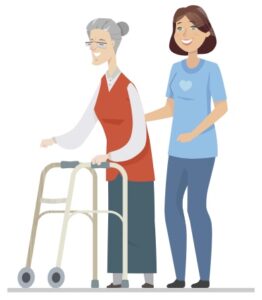As you are different to other people with COPD, the things that help keep you well will be different to those that keep other people well. Everybody has good and bad days. The following is a list of tips and suggestions that can help maintain your mental wellbeing and keep you well.
1. Routine: Having a regular routine helps maintain balance and increases your sense of control. In your routine, you should have a healthy balance of activities you need to do as well as fun activities that you want to do and can look forward to. Taking part in enjoyable activities can give you a sense of meaning and can help you maintain and enhance your skills and abilities. These don’t need to be energetic, expensive or adventurous. Examples might be phoning or visiting a friend, going to the cinema, painting, cooking, doing an evening class, taking a walk every day.
 2. Be active: Physical activity is good for people with COPD. Plan regular activity (e.g., walking, cycling) into your routine to keep your fitness level up. Make a plan for how you can build up your activity level gradually and pace yourself in working towards your goals. Talk with your health care professional about the type, frequency and intensity of exercise that is right for you. You may be able to join a Pulmonary Rehabilitation Programme at your local hospital or primary care centre or join a COPD Support Ireland exercise class if there is one in your area. Getting out of breath during activity is normal. It helps the heart and lungs become healthier and fitter. There are numerous benefits of being physically active. If possible, exercise earlier in the day so as not to disturb your sleep.
2. Be active: Physical activity is good for people with COPD. Plan regular activity (e.g., walking, cycling) into your routine to keep your fitness level up. Make a plan for how you can build up your activity level gradually and pace yourself in working towards your goals. Talk with your health care professional about the type, frequency and intensity of exercise that is right for you. You may be able to join a Pulmonary Rehabilitation Programme at your local hospital or primary care centre or join a COPD Support Ireland exercise class if there is one in your area. Getting out of breath during activity is normal. It helps the heart and lungs become healthier and fitter. There are numerous benefits of being physically active. If possible, exercise earlier in the day so as not to disturb your sleep.
3. Eat and drink well: Eat healthily and include a wide variety of nutritious foods. Don’t use alcohol or cigarettes to manage stress.
4. Sleep well: have a regular bedtime and routine before going to sleep. Frequently not sleeping well can make us feel exhausted,
irritable, stressed and depressed.
 5. Be social: get out regularly catching up with friends and family. If you cannot get out, ask them to call round or to phone for a chat. Get help, support
5. Be social: get out regularly catching up with friends and family. If you cannot get out, ask them to call round or to phone for a chat. Get help, support
and encouragement from family and friends. Don’t be afraid to ask for help from a family member, friend or professional. Accepting help from others strengthens your ability to cope. Get involved in social activities. Consider joining a patient support group. Visit www.copd.ie or call 086-0415128 for a list of support groups in Ireland including the singing for lung health programme SingStrong.
6. Be mindful and aware of your automatic and unhelpful thinking. When you feel stressed or anxious, you may respond to thoughts too quickly. Take some time and ask yourself if there are other ways in which you can think about a situation. You can break a harmful cycle of thoughts, feelings and behaviours. Think about what you can do to manage the situation to keep you well. When you are getting emotionally upset, you will need to decide what you can do to avoid the situation from becoming worse or how you can reduce the emotional impact of the event.
7. Focus on things you can control. When you are not doing as well as you would like at a particular behaviour, avoid focusing on the things you cannot control as this can lead to feelings of hopelessness. Instead, focus on what can be changed and change them. This can foster positive feelings of hope and persistence at the task.
8. Relax: plan time in the day for you to relax. Relaxation can be formal (e.g., deep breathing, muscle relaxation) or informal (watch TV, listen to music, reading)
 9. Have goals: A goal is something that we aim for that gives us a sense of focus and keeps us motivated. It is important that it is personally meaningful to you. It could be something like visiting a friend/neighbour, going to a social event, doing the gardening, or walking to the shops. The goal should be achievable and enjoyable. Break the big goals into smaller steps. They are easier to complete and it’s easier to see your progress. These provide a gradual sense of accomplishment that can motivate you to continue. Pace yourself in achieving the goal: it will take time; you need to go at your pace, and remember you are not competing with others. Expect good and bad days, and after a bad day, it is important try again. Working towards a goal and achieving it helps build confidence and makes us feel better.
9. Have goals: A goal is something that we aim for that gives us a sense of focus and keeps us motivated. It is important that it is personally meaningful to you. It could be something like visiting a friend/neighbour, going to a social event, doing the gardening, or walking to the shops. The goal should be achievable and enjoyable. Break the big goals into smaller steps. They are easier to complete and it’s easier to see your progress. These provide a gradual sense of accomplishment that can motivate you to continue. Pace yourself in achieving the goal: it will take time; you need to go at your pace, and remember you are not competing with others. Expect good and bad days, and after a bad day, it is important try again. Working towards a goal and achieving it helps build confidence and makes us feel better.
10. Write things down. Keeping a diary or simply writing down a thought can greatly help to cope with problems. Write things down to help show you how you think about your situation. It allows you to organize your thoughts and to look at the situation as an outsider. You can re- write it, come back to it later or simply throw it away when you’re finished.
11. Knowledge: learn about your COPD, stress, anxiety and depression. Being aware of signs and symptoms helps you understand what is happening
12. Visit your GP: Visit your doctor regularly to review your COPD and mental health. They can work with you to ensure you stay well and live well.
